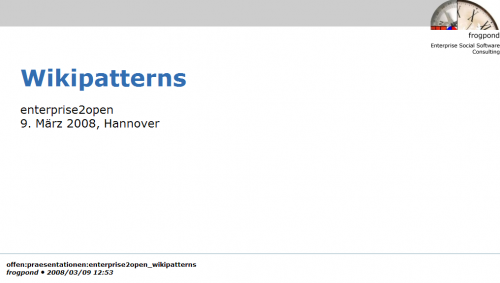Der vierte WikiWednesdayStuttgart war ein rundum gelungener – weil arbeitsintensiver und dennoch atmosphärisch lockerer Nachmittag (und Abend), allen Teilnehmern und Mitwirkenden ein herzliches Dankeschön (Fotos bei Kai).
Ich komme nun erst recht spät zum Bloggen und Dokumentieren – ein kleiner Grund ist der ungeschickte Termin. Beim nächsten mal wählen Cedric und ich auf jeden Fall nicht mehr (Oster-)Ferien, zu eng liegen dann doch die sonstigen Aufgaben.
Dennoch ist das Oberthema Projektmanagement (PM) zu spannend um einfach zum normalen Blogging und Geschäft (was meist eben auch projektbasiert abläuft) überzugehen, zumal wir drei herausragende Vorträge hatten.
- Angefangen hat Lars Zapf von Simprove, der einen Vortrag über Social Project Management (SPM) gehalten hat.
- Karoline Kraus von TQU aus Neu-Ulm hat über Erfahrungen mit Wikieinführungen gesprochen
- Oliver Gassner hat eine spontane GTD-Session gehalten
Einige meiner Notizen (und Überlegungen) zu Lars’ Vortrag:
– wir brauchen neue Methoden im Projektmanagement, die alten Herangehensweisen tragen nicht mehr
– “Social Project Management” ist sowohl gutes Branding, als auch Programm
– 2.0 impliziert eine gewisse Wertung, die mir auch nicht gefällt. Social Web ist prägnanter als Web 2.0.
– klar, es gibt nicht das Werkzeug für PM, Projektleiter (und Programmmanager) brauchen einen gut gefüllten Werkzeugkasten und eine gewisse Virtuosität (und Erfahrung) bei Auswahl und Einsatz des Instruments
– ich schreibe bewusst Instrument und nicht Werkzeug – Instrument ist das Bundle von Methode und Werkzeug
– strukturierte Vorgehensweise bleibt wichtig, aber die Art und Weise der projektbasierten Zusammenarbeit muss sich ändern – und ändert sich auch (manchmal …)
– die Zusammenarbeit via Email stört eher – u.a. weil der “Flow of Work” zu oft und aus zu geringen Anlässen unterbrochen wird, Email ist eine tendenziell unstrukturierte Form der Zusammenarbeit …
– Kommunikation muss weg von Push- und hin zu Pull-Funktionalitäten (RSS anyone?)
– um die weltweit verteilte Zusammenarbeit von (virtuellen) Projektteams besser zu koordinieren und zu unterstützen sind Wikis schon besser geeignet
– Realität sind jedes mal neu zusammengestellte Projektteams, mehr Freelancer, mehr Externe, mehr Kunden und andere (Projekt-)Stakeholder … die mit heterogenen (IT-)Werkzeugen zurechtkommen müssen …
– bittere Realität ist es auch dass allzu leicht (der Schwabe sagt “gerne”) im Stress auf lang (und früh) eingeübte Werkzeuge der Zusammenarbeit zurückgefallen wird (“when the going gets rough nobody edits the wiki”)
– Lars: “Wikis werden in D gerade als potenzielle Lösung verstanden und evaluiert” – stimmt, die breite Akzeptanz fehlt aber noch, entwickelt sich im Moment, 2008 wird WikiJahr
– Social PM lehnt sich an die Ideen von Wikinomics an, konzentriert sich auf das Wesentliche – Kommunikation als erste Priorität
– Simplify your Projects: Reduktion des PM auf Kommunikation, Meilensteine, Aufgaben
– Lars: “Social PM braucht neue Art von PM-Software: keine Balkenplan-Ansicht, keine Vorgangsverknüpfung, kein kritischer Weg, keine Bearbeitungsdauer” – OK, da bin ich dabei, Einschränkungen siehe weiter unten
– Immer wieder gern daran erinnert: Parkinson‘sches “Gesetz”: Ein Aufgabe braucht solange wie man ihr Zeit einräumt (und wenn Pufferzeiten vorgesehen sind, werden diese auch genutzt)
– Social PM ist sicher nicht für jedes Projekt geeignet, klassische Projekte und klassische Instrumente (“Balkenplanung mit MS Project”) haben weiterhin ihren Platz
– Social PM ist sowohl Methodik als auch empfohlene, bewährte Abarbeitungsstrategie für jeden einzelnen (Wissens-)Arbeiter.
– Social PM ist ein Grundgerüst für die Zusammenarbeit in Projekten, benötigt angemessene Toolunterstützung – andererseits sind viele Wissensarbeiter bereits “toolgeschädigt”
– Social PM greift auf verschiedene Vorläufer und deren Instrumente zurück, wichtig sind u.a. Merlin Manns 43folders.com, GTD, die 4-hour workweek (ja, mein Liebling, best quote ever: “doing something unimportant does not make it important”), Getting Real (ja, auch ein Liebling, warum Probleme, Design und Prototyping spannend sind? siehe hier)
– wir sollten neue Instrumente auf Einsatzarenen prüfen, bspw. hat CoreMedia mit Trillr eine Business-Twitter Adaption eingerichtet, wir können aber auch ganz banal den Gruppenchat von Skype verwenden …
– Social Bookmarking und Social Networking in Projekten ist auch spannend
– …
Hier noch die Folien von Lars’ Vortrag (und der zugehörige Blog-Eintrag):
Meine Notizen (und weitergehenden Überlegungen) zum Vortrag von Karoline Kraus vom Steinbeis Transferzentren Qualität im Unternehmen (TQU).
– TQU-Kerngeschäft ist Beratung und Managementunterstützung – Managementsysteme und mehr, d.h. es geht um interne Organisationsgestaltung
– TQU = Projektarbeit, Weiterbildung, Qualifizierung, Information
– aus diesen Aufgaben (Organizational Re-Design) ergab sich der Einstieg in Richtung Wiki ganz natürlich
– TQU setzt internes Wiki seit 2 Jahren ein
– einige interessante Fallstudien und Praxisbeispiele, u.a. aus Gesundheits- und Sozialbereich, aus KMU, etc.
– erfolgreiche Einführungen starten oft mit Erklären, der Grundprinzipien von Web 2.0 und Social Software, der Motivation, der verfolgten (Unternehmens-)Ziele
– erfolgreiches Vorgehen durch Beachten von Erfolgsfaktoren, u.a. kleine Projektteams, Projektmarketing, frühzeitiges Vergeben von Rollen, d.h. Rechten und Pflichten, (initiale) Inhalte, MA-Schulung und Training, …

